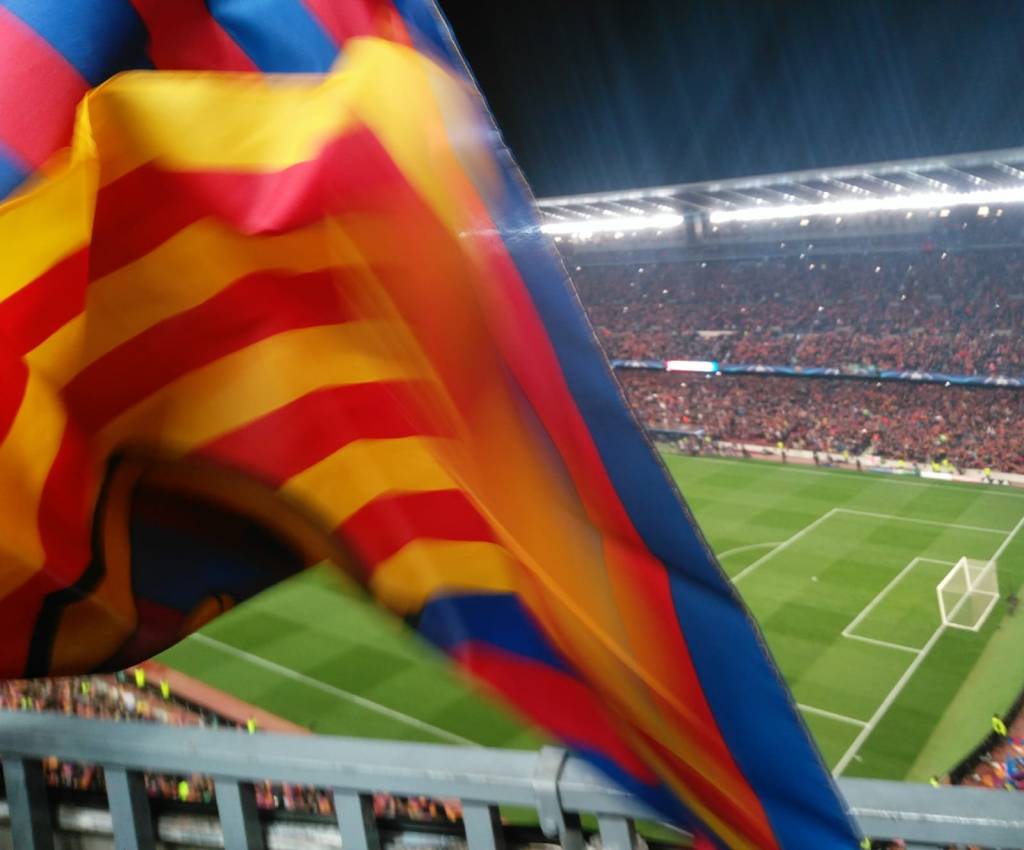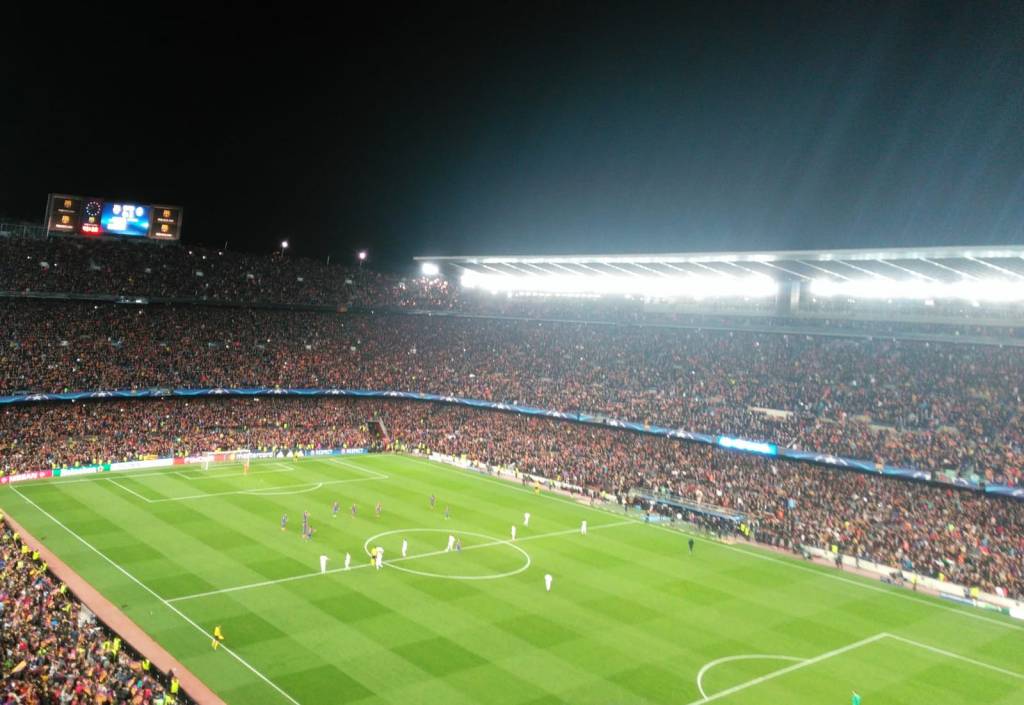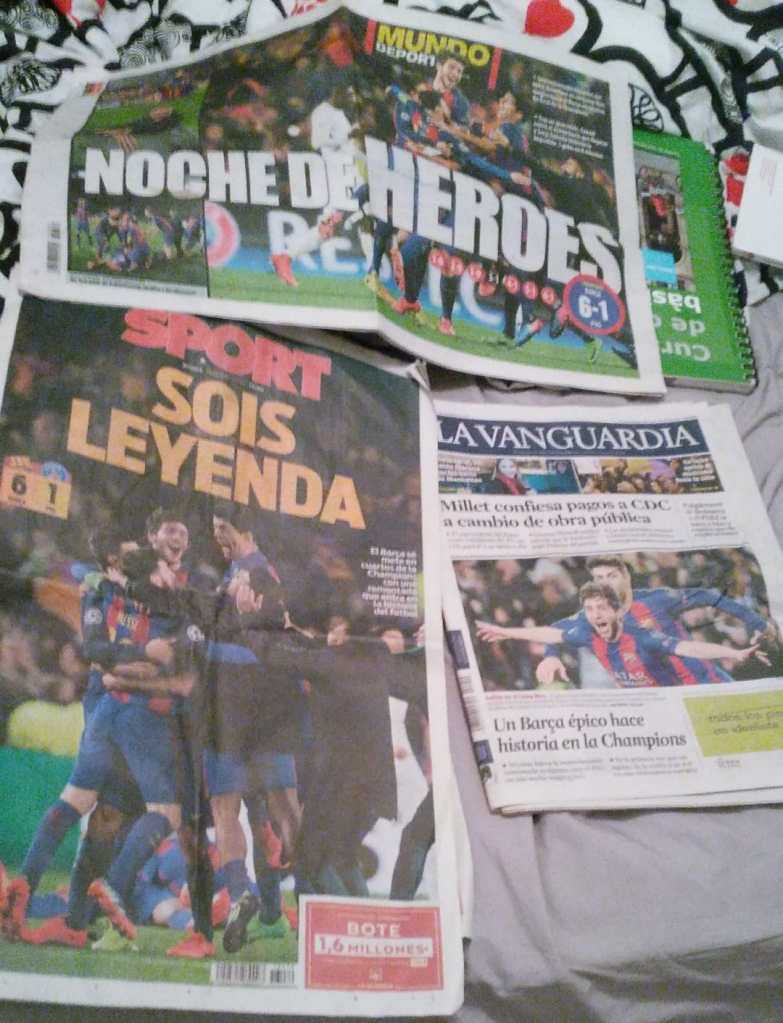This post has been guest written by Ruairidh Barlow, a Barcelona fan with an eclectic knowledge of Spanish football. Ruairidh has previously written for the Glasgow Guardian covering the University of Glasgow’s men’s football teams. During his year abroad in Catalonia, he witnessed one of the greatest comebacks in Champions League history as Barcelona defied both belief and expectation to overcome Unai Emery’s Paris Saint Germain at Camp Nou. Somewhat green with envy, I contacted Ruairidh and had him retell the most poetic of evenings. Remarkably, given the implausibility, phantasmagory and unbridled preposterousness of Barca’s fairytale remontada, I think his words have somehow managed to do it full justice…

A foregone conclusion
It is a surreal feeling, to be going to a game where the final result has already been decided. There was admittedly a faint glimmer of hope in the Catalonian air, on the metro and in the bars. The Spanish media had been doing their level best to whip up an atmosphere, to persuade the public that all was to play for. Those efforts always felt, however, like an unconvincing show; a futile attempt to add some sort of meaning and verve to a tie that had been all but concluded under the glittering lights of the Parc des Princes a couple of weeks earlier.
And yet this was exactly the case in early March 2017 as Paris Saint Germain travelled to Barcelona for the return fixture in the first round of the Champions League knockout phase. Their 4-0 first-leg demolition of the Catalans in the French capital had been a point of inflection for both sides: PSG were finally showing their credentials as genuine European cup contenders; Barcelona, meanwhile, had swung violently into crisis mode, everything and everyone under scrutiny.
This was not exactly forecast, and the resounding manner of the French side’s victory left the football world spinning and scratching its head in both disbelief and admiration. Thus far, Luis Enrique’s side, so electric on paper, had struggled through the season with a few too many unconvincing draws. While Barca had been far from their mercurial best under Enrique, they had however reached the final of the Copa del Rey and remained in contention for the two other titles on offer. There was a degree of discontent but certainly no disaster. Additionally, Enrique retained the credit of two immensely successful previous campaigns.
That credit had however long since expired by the eve of the second leg against PSG. The sporting media are invariably dramatic and particularly so in Spain, but this was meltdown on a scale rarely seen before. It was the end of an era, the death of total football and several of the world’s greatest footballers of the last decade were ‘finished’. It was not just a terrible result but a ‘humiliation’, a ‘total catastrophe’, for a Barca that was ‘soulless’, in the words of the Spanish tabloids. In the intervening period between the first and second legs, the Blaugrana claimed four straight wins in La Liga, keeping themselves in the title race, two of which were by a margin of five goals. Still, all of this was conditioned by the Paris debacle, and a solemn atmosphere hung around the Camp Nou.
I had watched the first leg unfold in my local taberna. The big screen was out, the conversation was loud and the atmosphere relaxed. This subsided quickly as a hopeless Barcelona failed to get into the game, conceding chances, then goals and then finally dignity. General frustration and aggressive cursing slowly gave way to silence, interrupted only by the muffled conversations of those who were not watching.
Spanish butterflies
To this day I cannot explain what exactly led me to purchase a ticket for the second-leg. At the time, I reasoned that it was perhaps my best opportunity to see Barca play a European knockout tie. Yet, even in hindsight, it still surprises me that I parted with a small fortune to suffer the second half of what would most likely be a painful elimination. Still, I found myself crammed into the L4 metro full of butterflies. Turning the corner and seeing the Camp Nou looming overhead, the anticipation washed over me. The small part of me which wanted to believe in the comeback was swiftly dismissed in an act of self-preservation. I was determined to enjoy the occasion, but the disappointment of the first leg was still chronically fresh in the memory.
To their credit, la grada d’animació [the singing section] were in full voice as I passed through the turnstiles, onto the concourse and made the vertiginous climb up towards the heavens. I admired their stubborn belief, or at least their conviction to create an atmosphere, at what was surely to be nothing more than a melancholic event. Arriving in my seat, the floodlights were on, the stadium was full and the atmosphere electric. Normally, there are a couple hundred travelling fans for league games, an afterthought shut away in the very top corner of the third tier. In contrast, European nights typically welcome several thousand away fans and the PSG faithful were basking, prematurely, in their newfound European glory. Camp Nou is often far from intimidating, but there is a different feel to the big games – that night especially, 95,000 people took Enrique’s defiance to heart and boomed out a spine-tingling rendition of the pre-match anthem.

Suarez strikes early
Barely had the noise subsided when the PSG defence committed that most criminal of defensive errors: allowing the ball to bounce in the box. Amongst the confusion, Uruguayan marksman Luis Suárez nipped in ahead of PSG ‘keeper Kevin Trapp and glanced the ball delicately over the German stopper’s frame. A roar grew and eventually surged around the stadium as the fans processed what had happened, not yet expecting to cheer with just two minutes on the clock. ‘A good start’ the man next to me remarked, neither of us adding the ‘but it is a long way from meaning anything’. The crowd was suitably ignited though. There was plenty of intensity, lots of sprinting, without much incision. Despite the ‘oo-ing’, ‘ahhh-ing’ and appealing for fouls at every conceivable opportunity, the next 38 minutes passed by with little of note occurring.
Yet, as the first half, and the fans, began to wind down, Andres Iniesta chased a lost cause. When Marquinhos failed to deal with the situation, the veteran Spaniard found a back-heel from nowhere to keep the ball in play. Just as with the first goal, confusion reigned and Kurzawa, still as a statue, couldn’t react to Iniesta’s quick thinking, the ball bouncing off the helpless Frenchman and in. Once again the roar erupted and once again the stadium believed. Trapp and his colleagues flashed looks of contempt at each other, furious that their defence had been breached so easily. Iniesta, Suárez and company, whooped, leapt and sprinted back to the half-way line instilled with a renewed sense of belief.

Realism, meanwhile, had departed the stadium in dramatic fashion. Everything was on and anything was now possible. My neighbour and I looked at each other with wide smiles and disbelieving eyes: “well, we’re half-way there”.
The Camp Nou was raucous as the teams went in at the break: the PSG players irritable and questioning each other as they ran into the bowels of the stadium; the Barca players eager to press on. So, just imagine the screams and shouts as 95,000 or so onlookers appealed for a penalty, this time right in front of the ‘grada d’animació’, the Barcelona hardcore…
Heightened Belief
The fans were still getting comfortable in their seats again, psyching themselves up for what promised to be an enthralling second half, and – penalty. With trademark precision, the affable Iniesta kissed the ball in behind Thomas Meunier, the Belgian full-back unable to turn fast enough to prevent Neymar from getting in behind. In his desperation, Meunier stumbled to the floor, obstructing the flamboyant Brazilian’s path to the ball. The former Santos frontman needed no second invitation to tumble to the ground. The stadium howled at the referee – but he remained unmoved. His byline-assistant, however, found Meunier guilty. After a short conversation, referee Aytekin gave the penalty and it was the turn of the PSG delegation to shriek in the Turk’s direction. Their sentence decided however, Lionel Messi took the ball and thumped it home emphatically. 3-0.
This time, the expressions around me were different. There was now real belief: the fourth goal, and the holy grail of parity, now seemed as inevitable as PSG’s progression into the next round had seemed only an hour or so beforehand. With forty minutes remaining, the tide, the momentum and the very will of the footballing gods, were all too great to be stemmed. Where previously there had been faint hope, there was now genuine conviction.
Minutes later, PSG’s Edinson Cavani struck the post following a precise cut-back from Julian Draxler as the French visitors searched for a crucial away goal. The Catalonian public, now really starting to enjoy themselves, paid that portent little attention and continued to fully revel in the revolution.
A cruel setback
Then, in the 61st minute, oxygen left the stadium. Hopes, dreams and happiness were obliterated in a second. Only the far-away commotion amongst the Parisian faithful pierced through the disconcerting shock. With the home defence caught sleeping from a deep free-kick, Layvin Kurzawa won the resultant header and the potent Cavani thundered a stunning volley into the roof of the net. Everything had flipped. With the Blaugrana sent hurtling cruelly back to the desolation of the Parc des Princes, the party atmosphere was now reserved solely for the euphoric travelling support.
The deflation inside the symbolic Camp Nou was tangible. There was mourning for what could have been, but overall a quiet acceptance that the team’s effort that night had been relatively satisfactory. Although there still was half an hour left to play, Barca needed three more goals without reply. The tie seemed over once again.
Awoken from their malaise, the French side regained their confidence and began to play. As much was illustrated when Cavani was sent through on goal, thwarted only by the boot of Marc-André ter Stegen. As the clocked ticked on, Enrique’s men threw multiple bodies forward in a desperate search for a route back in to the tie. This naturally afforded PSG’s devatasting front line ample opportunity to expose the increasingly depleted Barca backline. Angel Di Maria was very nearly the beneficiary, save for a miraculous tackle by his fellow countryman, Javier Mascherano. At the other end, time sped by, with little more than desperate half-chances falling to Messi and then Arda Turan.
A late lifeline or two
Entering the 87th minute, with the tie all but lost, the match was being played almost exclusively in one half. Neymar, the best player on the pitch, bamboozled yet another Parisian defender and was brought down mercilessly on the edge of the box. Such was his performance (or perhaps the futility of the situation), that Messi entrusted the Brazilian with the free-kick. ‘Well, that was pretty good,’ remarked my neighbour, grinning. Despite the situation, it was hard not to enjoy such a phenomenal strike, smacked past the keeper with pinpoint precision. Too little, surely too late though.
While the previous half-hour had raced by, the seven minutes that followed seemed to last an eternity. Almost immediately after the restart, Messi lofted an up-and-under into the box for Suárez to chase. With the Uruguayan and the Argentine for once on different wavelengths, the grateful Kevin Trapp claimed the through ball easily. Inexplicably, Suárez had however flopped to the floor under light pressure from Marquinhos. To the disbelief of all present, Barca had another penalty. The stadium erupted just as it had before Cavani’s untimely, mood-killing goal: hope, intensity and overwhelming noise all came flooding back. With 90 minutes played, Neymar duly dispatched the spot-kick to set up an exhilarating finale. One more goal and Barca were through.
One more goal
Frantically, Barca attempted to create one more opportunity. Hearts thudded against chests and grown men jumped off their seats to appeal for every last throw-in. Messi stood over a wide free-kick and ter Stegen rushed forward for what looked like the last proverbial throw of the dice. With the set-piece headed away by the first man, Arda was then dispossessed cheaply in midfield. For most teams, that would have been that. But this was Barcelona: “més que un club” as they say. Marc-André ter Stegen, the unsung hero, coolly won the ball back before being hacked down unceremoniously. The subsequent free-kick was half-cleared by the panicking Parisian rearguard. Neymar picked up the loose ball, shaping with his right before cutting back onto his left. His lofted pass over the defensive line looked too heavy. But to everyone’s astonishment, Sergi Roberto ran in unnoticed, unsuspected and, most importantly, unmarked to latch on to Neymar’s incisive delivery. Curving his run perfectly, the Spaniard stretched out to toe the ball past a bewildered Kevin Trapp and into the net.
Barcelona had done it. Bloody hell.
The beautiful game at its beautiful best
Ecstasy. Bedlam. Chaos. Pandemonium. There were no words, just noise and elation. Tears flowed in the stands as the coaching staff flowed onto the pitch. The crowd became a fluid mess of embraces and shouting, the pensioners and the teenagers, the kids and the casuals. It took several minutes for the stadium to return to the football match, for the players to return to their own half and the staff to their bench. There was then, of course, the briefest of 60-second intermissions – which involved the ninth kick-off of the match and the ball being hoisted into the air – before the Turkish referee blew the final whistle and the celebrations exploded again.

How long the players and the fans stayed after the end of the game, I wasn’t quite sure. It seemed a never-ending symphony, conducted by the heroic players. Messi standing, messiah-like, on the barricade punching the air was the photo of the night. A thousand more images adorned the fawning newspaper columns the next day. The city buzzed all night and for several days after, still reeling from the quite remarkable story that had unravelled inside Camp Nou. In my own workplace, even those who don’t follow football were enthused.
For a team like Barca, being rank outsiders or even underdogs is an unfamiliar experience, at least in recent years. Trophies have been regular and they are quite rightly celebrated with gusto. There is no denying, however, that glory is an expectation, both institutionally and from the demanding fanbase. The European Cup is very much a realistic target rather than the impossible dream it used to be. For one match only, Barca had to face an impossible task laced with little hope and no expectation. But, somehow, Messi et al. completed the greatest comeback the Champions League has quite possibly ever seen. I remain eternally grateful I was there to witness it.

The come back of all come backs.
LikeLiked by 1 person
Great game.
LikeLike
Thank you for wrriting this
LikeLike